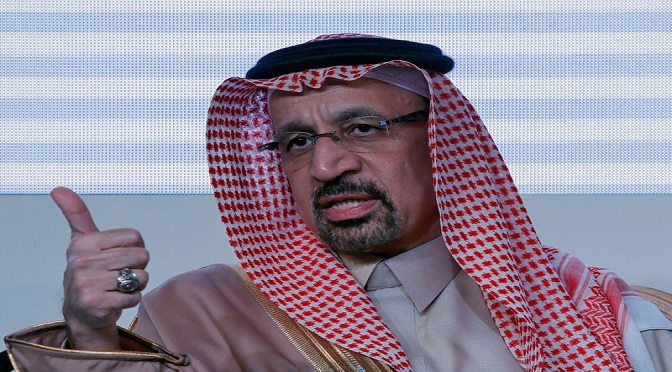-
Authoradmin
-
Comments0 Comments
-
Category
By Rania El Gamal and Stephen Kalin
RIYADH (Reuters) – The Saudi energy minister said on Monday it was premature to say whether a consensus existed among OPEC and its allies to extend oil supply cuts, but a meeting next month would be key.
A joint OPEC and non-OPEC ministerial committee known as the JMMC is due to meet in May. Saudi Arabia and Russia are members of the panel, which includes other major oil producers that took part in a global supply-cutting agreement last year, such as Iraq, the United Arab Emirates, Kuwait, Nigeria and Kazakhstan.
“JMMC will be a key decision point because we will certainly by then know where the consensus view is and, more importantly, before we ask for consensus, we will know where the fundamentals are pointing,” the Saudi minister, Khalid al-Falih, said.
“I think May is going to be key,” he added.
Oil inventories remain higher than average but the market is on its way towards rebalancing, Falih added.
“I don’t think we will need (to do more) … the market is on its way towards balance. We have done a lot more than others,” he said, referring to the possibility of Saudi Arabia cutting output further below its target under the global deal.
“We are getting to a stage where inventories are starting to stabilize and come down but still significantly above what I would consider a normal level.”
Russia, which is cutting oil output in tandem with OPEC, also said production cuts would stay in place at least until June, when Washington’s next steps on reducing Iranian and Venezuelan oil exports become clearer.
The United States has been increasing its own oil exports steeply, while U.S. President Donald Trump has been pressing OPEC to lower the price of the commodity by boosting production.
U.S. policies targeting Iran and Venezuela have introduced a new level of uncertainty for OPEC as the producer group struggles to predict global supply and demand. Washington is also advancing a bill, known as NOPEC, that could expose OPEC members to U.S. antitrust lawsuits.
The NOPEC move prompted Saudi Arabia to threaten to sell its oil in currencies other than the dollar if Washington passes the bill, three sources familiar with Saudi energy policy told Reuters last week.
However, Falih told reporters at an oil event in Riyadh that there was no change to the kingdom’s long-standing policy of trading oil in U.S. dollars.
“Absolutely not. There is no change whatsoever to our long-standing policy,” Falih said when asked to comment on the possibility that Saudi Arabia could ditch the dollar.
The United Arab Emirates’ energy minister, Suhail bin Mohammed al-Mazroui, also said on Monday that the use of the dollar as the main oil-trading currency could not be changed overnight.
Recent Comments
- Starlight Herot on Euro Higher on German Data, Sterling Edges Lower
- Frost Dragont on Euro Higher on German Data, Sterling Edges Lower
- Gwinnettt on Euro Higher on German Data, Sterling Edges Lower
- Vanessat on Euro Higher on German Data, Sterling Edges Lower
- Christinet on Euro Higher on German Data, Sterling Edges Lower
Archives
- April 2025
- March 2025
- February 2025
- January 2025
- December 2024
- November 2024
- October 2024
- February 2024
- July 2023
- July 2021
- May 2021
- March 2021
- February 2021
- September 2020
- May 2020
- February 2020
- December 2019
- November 2019
- October 2019
- September 2019
- August 2019
- July 2019
- June 2019
- May 2019
- April 2019
- March 2019
- February 2019
- January 2019
- December 2018
- November 2018
- October 2018
- September 2018
- August 2018
- July 2018
- June 2018
- May 2018
- April 2018
- March 2018
- February 2018
- January 2018
- December 2017
- November 2017





